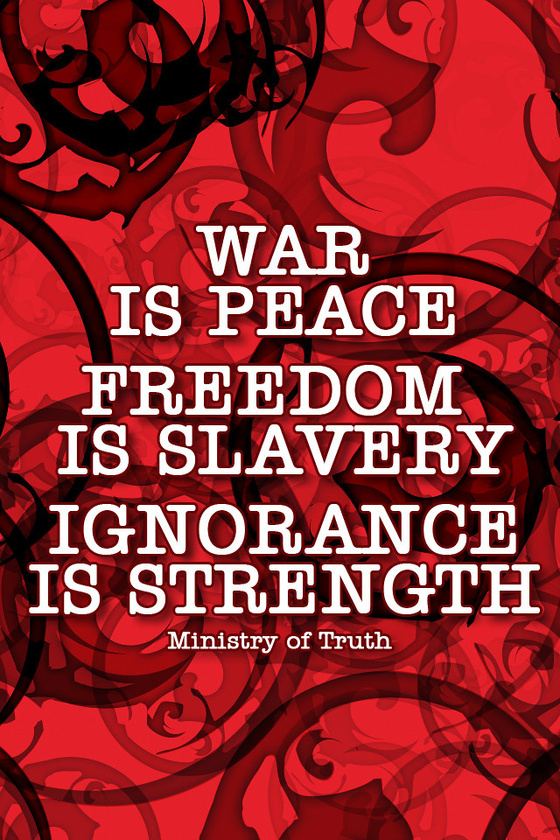
I’ve been rereading George Orwell’s 1984 recently, and it isn’t something I would recommend doing right now because some of the similarities with what we are seeing today might give you a panic attack. With today’s implementation of Newspeak concepts like crimestop, blackwhite, and doublethink, we are being trained in the ways of building shallow arguments so as to not think too hard or apply logic. Let me explain.
Orwell, or rather Orwell’s 1984 character Emmanuel Goldstein, defined crimestop as the “faculty of stopping short, as through by instinct, at the threshold of any dangerous thought.” Today we see this when defending against microaggressions. A microaggression, as defined by Derald Wing Sue who popularized the term in 2007, is defined as “brief and commonplace daily verbal, behavioral, or environmental indignities, whether intentional or unintentional, that communicate hostile, derogatory, or negative racial slights and insults toward people of color.” The term definition has since then been broadened. In the book The Coddling of the American Mind by Jonathan Haidt and Greg Lukianoff, they defend against the use of microaggressions by stating, “If the aggressive act is minor or subtle, then the term ‘microaggression’ seems well suited for the situation. But aggression is not unintentional or accidental. If you bump into someone by accident and never meant them any harm, it is not an act of aggression, although the other person may misperceive it as one. Teaching people to see more aggression in ambiguous interactions, take more offense, feel more negative emotions, and avoid questioning their initial interpretations strike us as unwise, to say the least. More generally, the microaggression concept reveals a crucial moral change on campus: the shift from ‘intent’ to ‘impact’.” The microaggression itself isn’t a crimestop, but the act of teaching people they must be conscious that any action towards a Person of Color (another Orwellian term) can be deemed as an aggression against them not matter the intent of the action. We must train ourselves to instinctively act different around people of oppressed classes so as not to offend them.
Blackwhite is defined as the “habit of impudently claiming black is white, in contradiction of the plain facts.” Today we see this with a modern rebranding of racism. Racism is okay as long as it goes in the politically approved direction. We can have spaces reserved for a specific racial group, hiring practices meant to benefit one race over others, and pride in one’s own race without blinking an eye. In fact, we praise that behavior if we can spin it as a way to reverse oppression, yet we can also blindly call other people racist who don’t agree with our ideology. We used to reserve the term racist to call out immoral actors, but now the term has lost all real meaning.
Doublethink is defined as the “power of holding two contradictory beliefs in one’s mind simultaneously, and accepting both of them.” Today we see this with movements like Defund the Police. Defenders of this idea typically claim that the word defund has an alternative meaning. Fine, maybe defund just means to reform law enforcement, but take a ‘Defund the Police’ poster and cross out ‘Defund’ and add the word ‘Reform’ and you’re likely to be called a racist. This is similar to replying to the Black Lives Matter (BLM) slogan with ‘All Lives Matter’. The latter is not acceptable even though if we were to poll every American and ask if they believe ‘black lives matter,’ quantify that number into a percentage of the population and round to the nearest whole number, 100% of people would yes to that question. This is because these two sayings hold two different meanings each depending on the definition needed at the time to prove a political point, and those two meanings often contradict each other.
All these terms applied today are meant to stop any sort of deep thought in exchange for adherence to the ideology. Exposing these bad, corrupt practices is the only way to defend ourselves against the tyranny of Big Brother.

I was listening to some news updates when I heard this CNN clip about the potentially hazardous water in East Palestine, and as soon as I heard her ask the question about whether or not her guest would drink the water, I IMMEDIATELY thought of this clip from South Park. Enjoy.
In this special episode of The Engineering Politics Podcast, Truman from Return To Reason is back for a new video and podcast series titled ‘Revisiting The Road To Serfdom’ where we review F.A. Hayek’s classic work, The Road To Serfdom. This episode covers ‘Chapter 15: The Prospects of International Order’.
This will be an ongoing series that covers the entire book. We put a ton of work into making this insightful and relevant, so we hope you enjoy watching/listening as much as we enjoyed reading and recording.
Become a subscriber of the Engineering Politics Locals Community to support this content. Also, consider joining the @ReturnToReason Locals Community to show Truman some support.
In this episode of The Engineering Politics Podcast, I team up with Truman from @ReturnToReason to interview one of the most intelligent and influential creators in the space of philosophy today. Stephen R.C. Hicks is a Professor of Philosophy at Rockford University, Executive Director of the Center for Ethics and Entrepreneurship, and Senior Scholar at The Atlas Society. He has written many books including Explaining Postmodernism and Nietzsche and the Nazis. We bring him on to talk about the social and political issues we are currently facing in America, and the West more broadly, and what the collectivist ideas of Jean-Jacques Rousseau might have to do with it.
Become a subscriber of the Engineering Politics Locals Community to support this content. Also, consider joining the @ReturnToReason Locals Community to show Truman some support.
In this special episode of The Engineering Politics Podcast, Truman from Return To Reason is back for a new video and podcast series titled ‘Revisiting The Road To Serfdom’ where we review F.A. Hayek’s classic work, The Road To Serfdom. This episode covers ‘Chapter 15: The Prospects of International Order’.
This will be an ongoing series that covers the entire book. We put a ton of work into making this insightful and relevant, so we hope you enjoy watching/listening as much as we enjoyed reading and recording.
Become a subscriber of the Engineering Politics Locals Community to support this content. Also, consider joining the @ReturnToReason Locals Community to show Truman some support.
In this episode of The Engineering Politics Podcast, I team up with Truman from @ReturnToReason to interview one of the most intelligent and influential creators in the space of philosophy today. Stephen R.C. Hicks is a Professor of Philosophy at Rockford University, Executive Director of the Center for Ethics and Entrepreneurship, and Senior Scholar at The Atlas Society. He has written many books including Explaining Postmodernism and Nietzsche and the Nazis. We bring him on to talk about the social and political issues we are currently facing in America, and the West more broadly, and what the collectivist ideas of Jean-Jacques Rousseau might have to do with it.
Become a subscriber of the Engineering Politics Locals Community to support this content. Also, consider joining the @ReturnToReason Locals Community to show Truman some support.
In this special episode of The Engineering Politics Podcast, Truman from @ReturnToReason is back for a new video and podcast series titled ‘Revisiting The Road To Serfdom’ where we review F.A. Hayek’s classic work, The Road To Serfdom. This episode covers ‘Chapter 14: Material Conditions and Ideal Ends’.
This will be an ongoing series that covers the entire book. We put a ton of work into making this insightful and relevant, so we hope you enjoy watching/listening as much as we enjoyed reading and recording.
Become a subscriber of the Engineering Politics Locals Community to support this content. Also, consider joining the @ReturnToReason Locals Community to show Truman some support.














